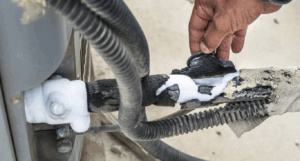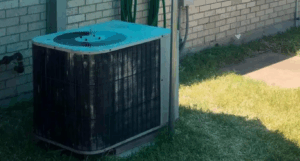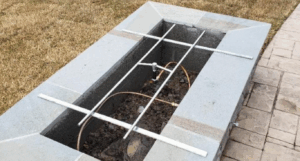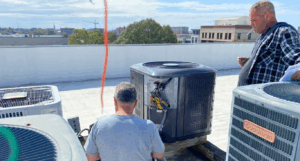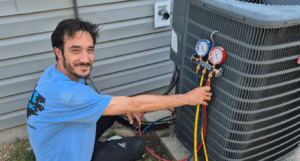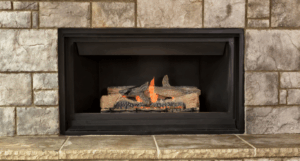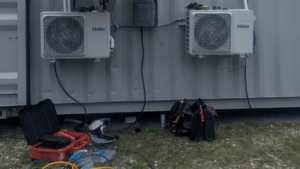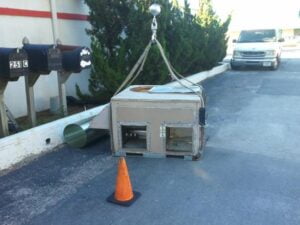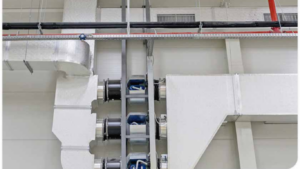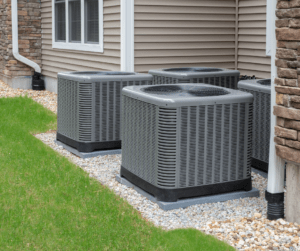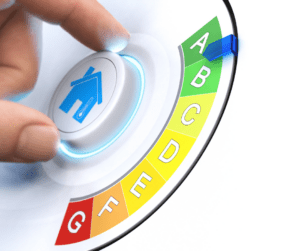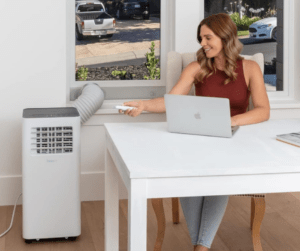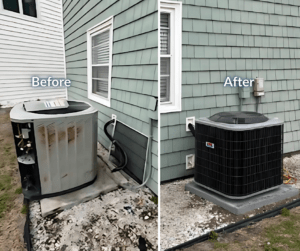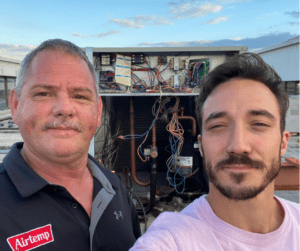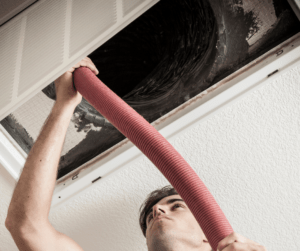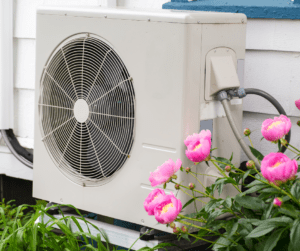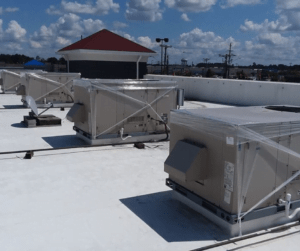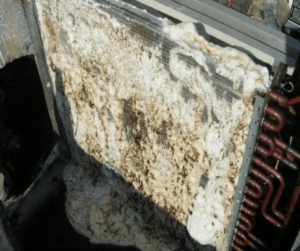5 Signs It’s Time for a Heat Pump Service Call
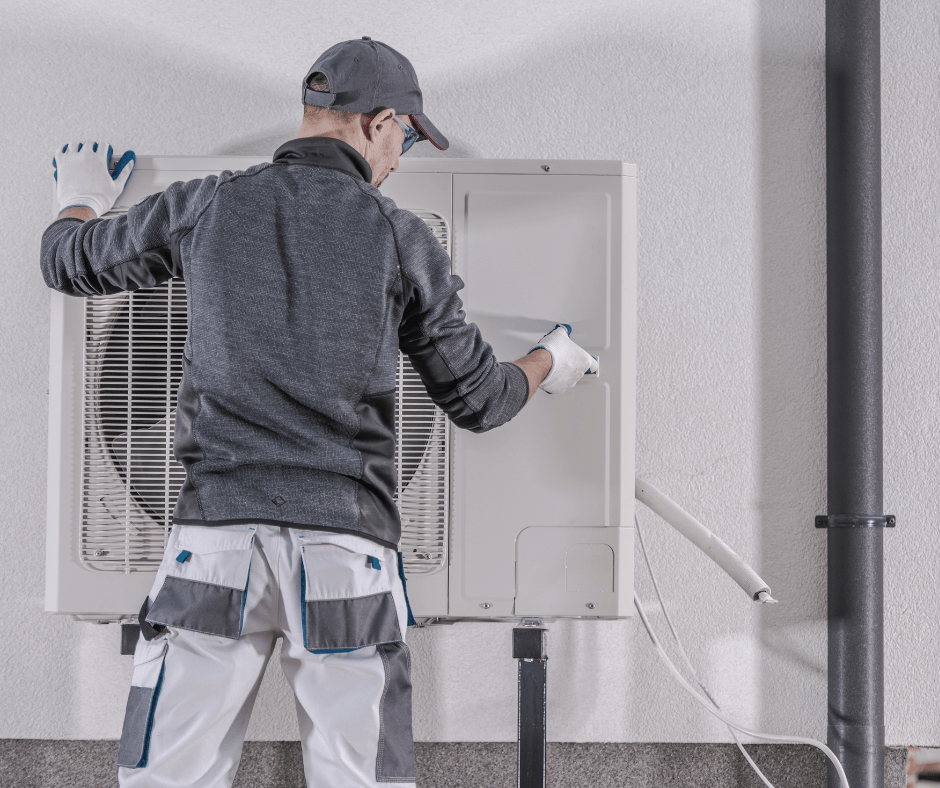
If you rely on a heat pump to keep your home comfortable throughout the year, it’s essential to ensure that it’s running efficiently. Regular maintenance and timely service calls are key to preventing breakdowns and maximizing the lifespan of your HVAC system.
In this blog post, we’ll discuss five signs that indicate it’s time for a heat pump service call. Addressing these issues promptly can help you avoid costly repairs and keep your home comfortable year-round.
1. Reduced Airflow and Uneven Temperature Distribution

Discovering that some corners of your home are chillier or toastier than others can be puzzling and frustrating. When your heat pump isn’t distributing warmth or cool air evenly, it’s like getting a gentle nudge that it’s time to peek under the hood. This could manifest as weaker air flow from your vents or a noticeable inconsistency in room temperatures. Before you wrap yourself in another blanket or crank up the thermostat, consider this an invitation to explore further.
Often, the culprit behind reduced airflow is as simple as a dirty air filter, which can be a quick fix. However, the plot thickens if the issue persists; ductwork complications or a blower motor acting up could be stealthily throwing off your home’s comfort balance. These are not just mere inconveniences but clues that your heat pump desires a bit of TLC.
Rolling up your sleeves to check the filter or ensuring vents are unblocked are great first steps. Yet, when the mystery deepens, it’s time to call in the HVAC experts. A seasoned heat pump service technician is like a detective for your system, equipped to trace the roots of uneven temperature distribution. They’ll scrutinize your unit with a keen eye, identifying any under-the-radar issues that might be causing discomfort in your living space.
This scenario is more than just about maintaining comfort; it’s about embracing efficiency and nurturing your heat pump’s health. By responding to these signs early, you’re not just fixing a temporary inconvenience—you’re investing in the longevity and effectiveness of your heating and cooling system. So, if your home’s temperature feels like a puzzle, it’s a good time to bring in an HVAC professional who can help put the pieces back together, ensuring every room in your house is just the right temperature.
2. Strange Noises Coming From Your Heat Pump
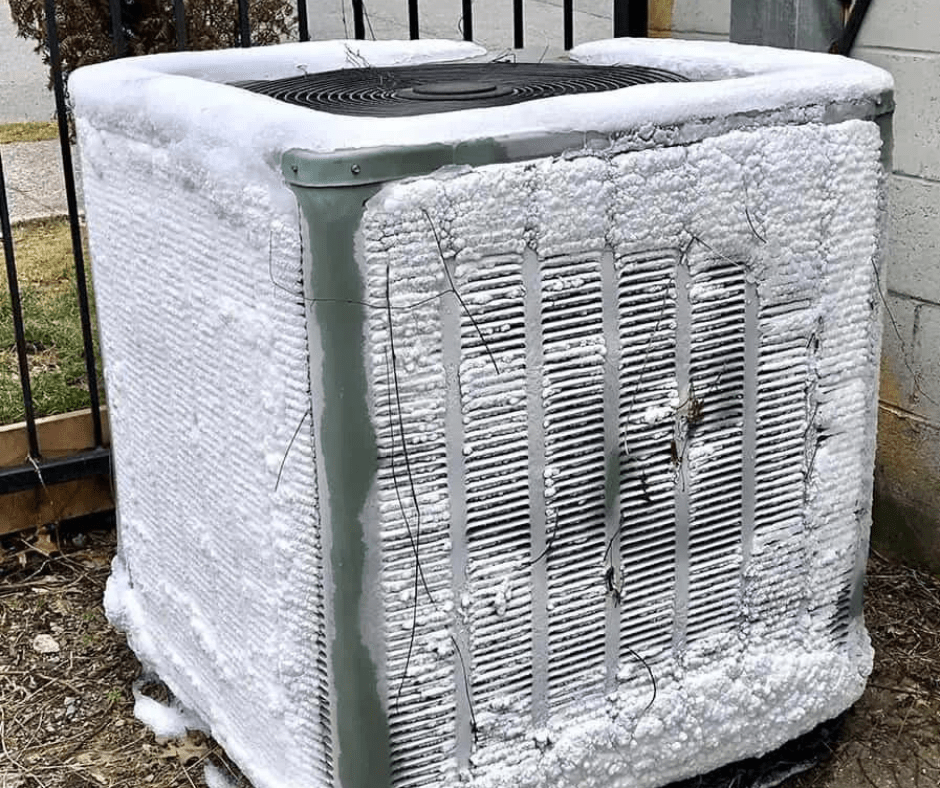
When your tranquil home ambiance is interrupted by the unexpected soundtrack of grinding, squealing, or even banging coming from your heat pump, it’s a signal that all is not well in the world of your heating and cooling system. These peculiar sounds can be unsettling and are your heat pump’s way of sending an SOS, alerting you that it’s time for some detective work.
Imagine each noise as a clue. A grinding sound might suggest that internal components are struggling to move as they should, possibly due to wear and tear. Squealing noises often hint at belt issues, which, while seemingly minor, can have major consequences if left unaddressed. And that alarming banging? It could be indicating something more serious, like loose or damaged parts that need immediate attention.
It’s crucial to listen closely. These aren’t just random noises but rather specific alerts pointing to areas of your heat pump that may be in distress. Ignoring them could turn a simple fix into a costly and complex HVAC repair job down the road.
Contacting a professional heat pump service company at the first hint of these auditory anomalies is akin to bringing in a skilled translator who can interpret what your heat pump is trying to communicate. A heating and air technician’s trained ears and expert eyes can swiftly identify the root cause of these noises, ensuring that any potential issues are nipped in the bud before they escalate.
In essence, these strange noises are not just a nuisance but a crucial communication from your heat pump, indicating that it’s time to take action. Promptly addressing them not only helps in averting potential damage but also contributes to the longevity and efficiency of your system, ensuring it continues to provide comfort to your home without missing a beat.
3. Rising Energy Bills Without Increased Usage

When your energy bills start to creep up without you changing your thermostat habits, it’s like your heat pump is trying to tell you something important. You haven’t changed your routine, but suddenly, it costs more to keep your home cozy or cool. This scenario is a common yet often overlooked sign that your heat pump might be working harder than it needs to.
This financial nudge is your cue to look closer at how your heat pump is performing. A system losing its efficiency doesn’t just whisper its troubles through higher bills; it’s practically waving a flag, asking for a little attention. Various factors could be causing this inefficiency, from minor issues like a clogged air filter to more significant concerns such as a malfunctioning component or the need for a refrigerant recharge.
A professional heat pump service company is your ally in translating what your increased energy bills are trying to communicate. With a thorough inspection, a technician can pinpoint exactly where your system is falling short of its efficiency potential. They have the tools and expertise to assess whether your heat pump is working overtime due to an easy-to-fix issue or something that requires more in-depth repair. Our goal and all other HVAC company’s goals? To restore your heat pump to its most efficient state, ensuring that it heats and cools your home without wasting energy.
Bringing in an expert heating and air conditioning contractor to assess and tune up your heat pump can lead to adjustments that significantly reduce your energy consumption. This not only brings down those rising bills but also contributes to the overall health and longevity of your system. Remember, an efficient heat pump isn’t just good for your wallet; it’s also better for the environment. So, when your energy bills start to inch upward without an obvious reason, see it as an opportunity to enhance your heat pump’s performance and secure a more sustainable, cost-effective comfort for your home.
4. Frequent Cycling On and Off
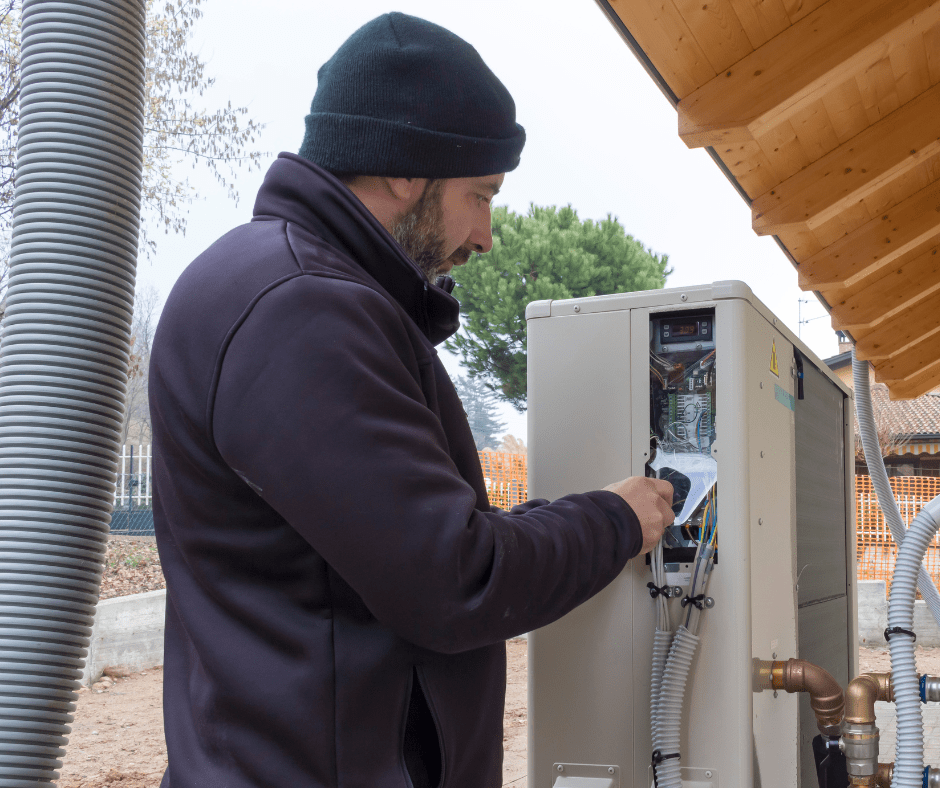
Noticing your heat pump switching on and off more than a jazz drummer hits a snare? That’s known as short cycling, and it’s akin to your heat pump sending out an SOS in Morse code. This phenomenon is far from a quirky characteristic; it’s a clear sign that your system is crying out for help. Short cycling can stem from a myriad of issues – think of a thermostat that’s not quite right, a sneaky refrigerant leak, or even a heat pump that’s too big or too small for your space. Each of these causes puts undue stress on your heat pump, leading to wear and tear that could shorten its lifespan and leave you with a less comfortable home.
The dance of constantly turning on and off not only strains the system but can also lead to a roller coaster of indoor temperatures. Imagine trying to read in peace, but you’re constantly distracted by the background noise of your heat pump’s incessant cycling. Far from ideal, right?
Here’s where the hero of our story steps in – a professional heat pump service company such as ourselves. By diagnosing the precise reason behind the short cycling, a heating and air technician can tweak, repair, or adjust your system back to its smooth-operating self. Whether it’s recalibrating a mischievous thermostat, sealing a refrigerant leak, or advising on the correct size heat pump for your home, these pros have the know-how to bring harmony back to your home’s heating and cooling system.
So, if you’ve noticed this frenetic cycling, it’s more than a mere annoyance—it’s your heat pump’s way of asking for a helping hand.
5. Unusual Odors Emanating From Your Heat Pump
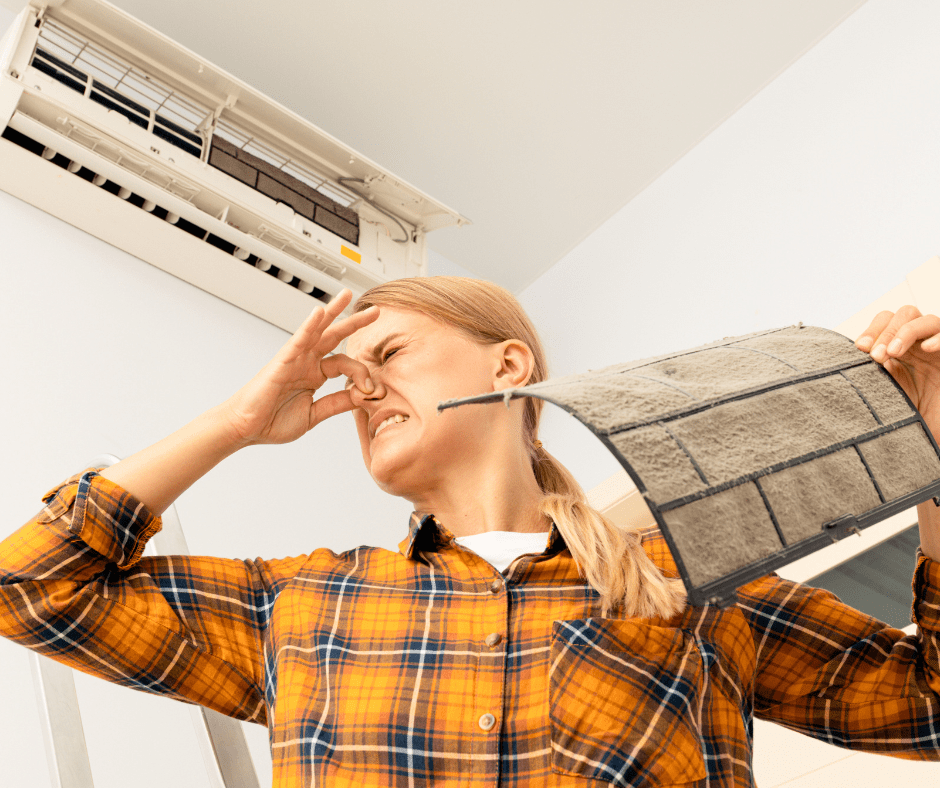
Discovering an unexpected odor wafting through your living space can be both unsettling and a clear sign that your system may need a closer look and that it is time for a heat pump service call. These unusual scents, whether they hint at mustiness or carry the sharp tinge of something burning, are not merely unpleasant; they are messengers signaling that something is not right within your heating and cooling system.
A musty odor often suggests the presence of mold or mildew within the system, especially in the ductwork, where moisture can accumulate and create a breeding ground for these unwanted guests. Not only does this affect your heat pump’s efficiency, but it can also significantly impact the quality of air circulating in your home, posing potential health risks.
On the other hand, a burning smell shouldn’t be taken lightly, as it may indicate overheating components or, even more concerning, electrical problems. These are not issues to sniff at, as they could lead to more serious safety hazards if not addressed promptly.
Navigating these odorous warnings doesn’t have to be a journey you take alone. A heat pump service technician such as ourselves here at Elite Contracting Solutions in Wilmington, NC, will be armed with expertise and specialized tools and can dive into the heart of your HVAC system, tracing the source of these smells. Whether it’s cleaning out mold, replacing faulty wiring, or addressing any other underlying issue, professional Heating, and Air Companies are equipped to freshen up your system’s operation and eliminate any odors at their root.
By tuning in to these unusual odors and acting swiftly, you are not just eradicating a temporary inconvenience; you are safeguarding the comfort, efficiency, and safety of your home environment. Remember, your heat pump’s whispers (or smells, in this case) are worth listening to—they are often the first hint that it’s time to show your system a little extra care.
Conclusion
With the information that you just learned, you should be well equipped with the knowledge to know if you are in need of a heat pump service call or if it is a simple issue you can take care of yourself. For more HVAC tips, be sure to read our following related articles.


